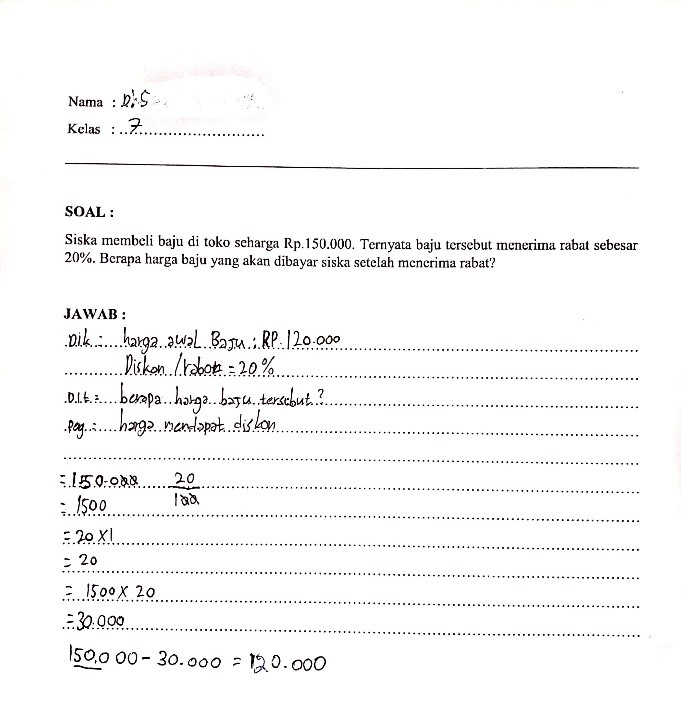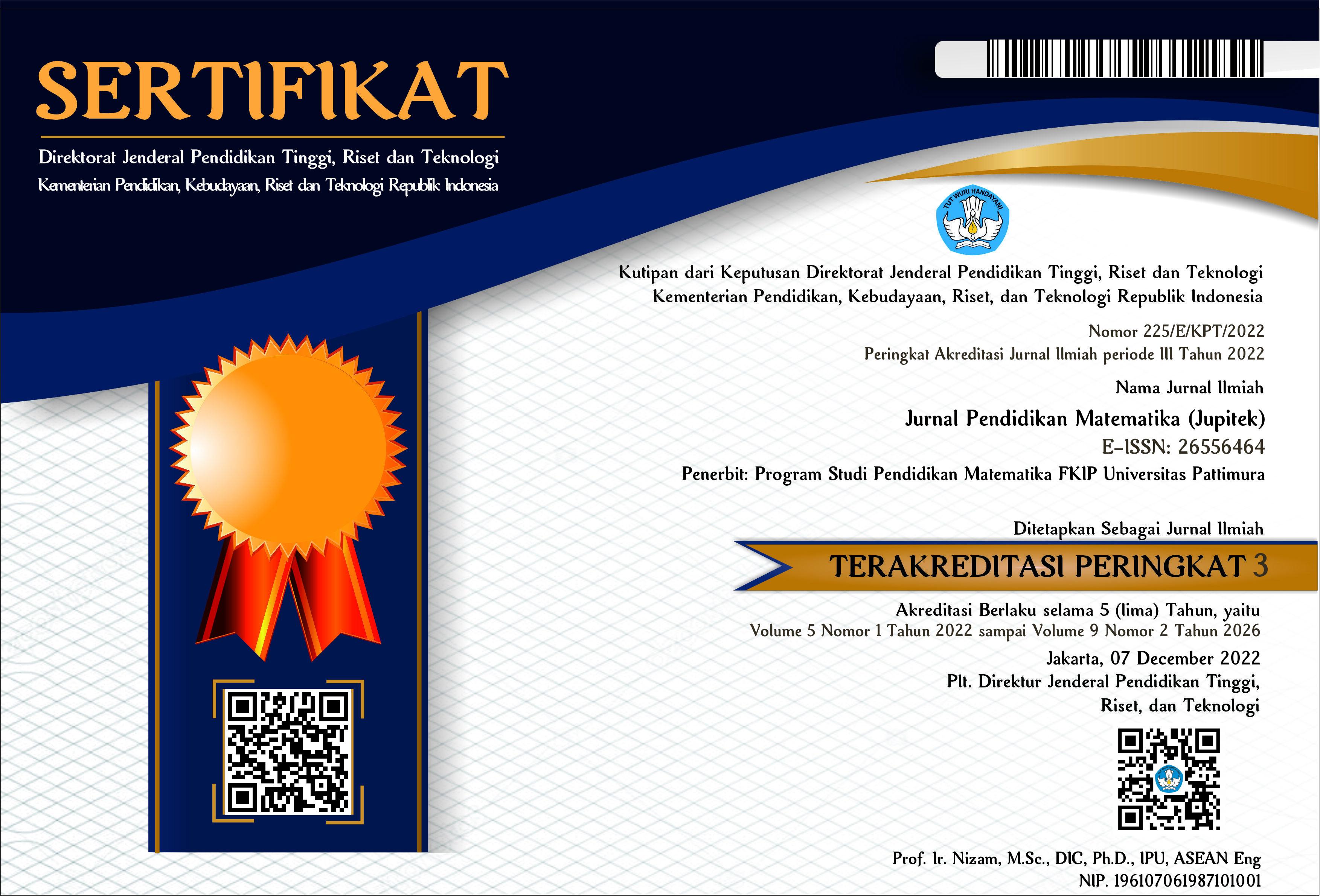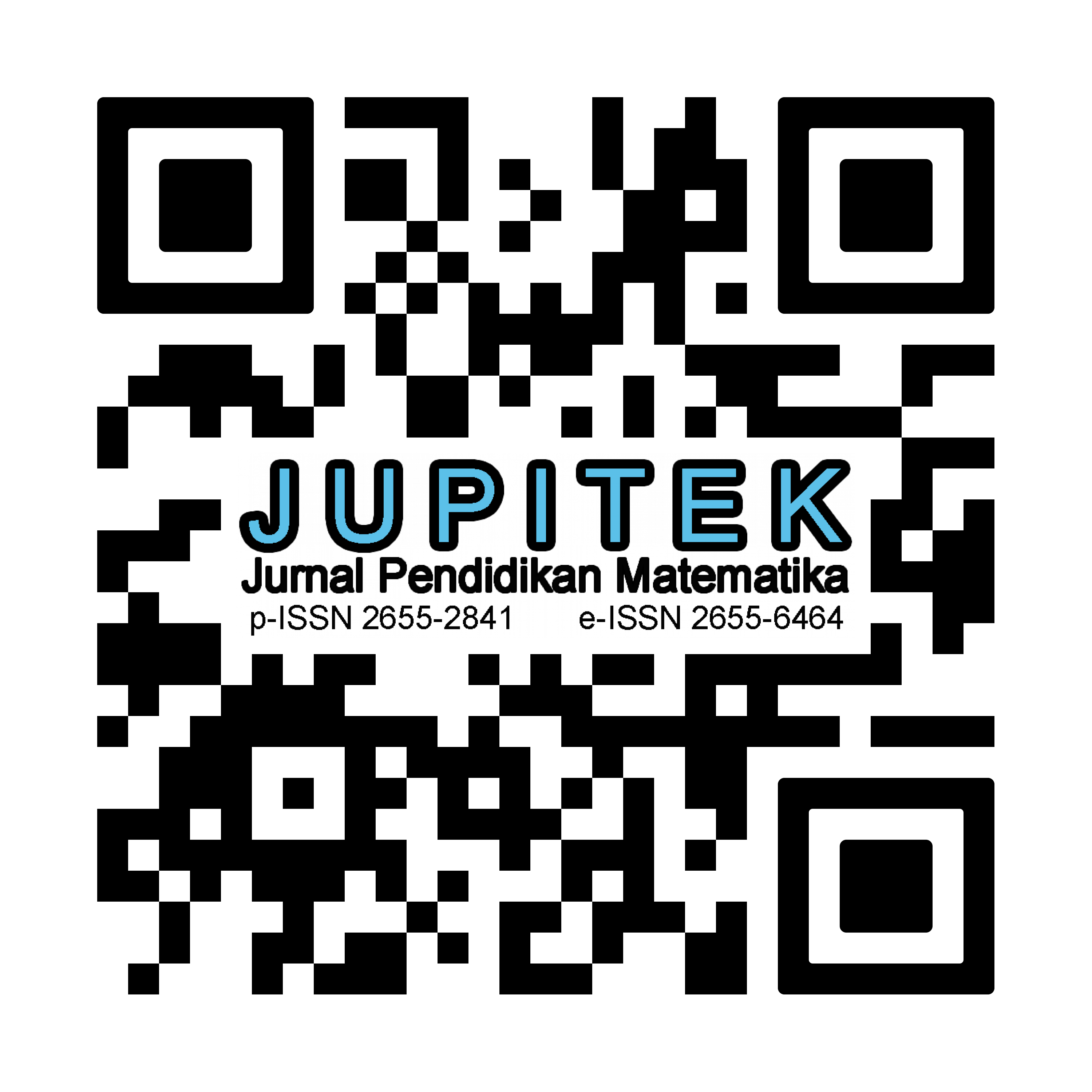THE EFFECT OF SELF-REGULATED LEARNING AND SELF-EFFICACY ON STUDENT’S SOLVING PROBLEM ABILITY
Abstract
Mathematics Problem Solving will give the expected results depending on a person's ability to control and direct his thinking activities (self-regulated learning) as well as his ability to have self confidence in solving problems. This study aimed to determine the effect of self-regulated learning and self-efficacy on problem-solving in social arithmetic material in class 7th graders of Public Junior High School 19 Ambon. The approach used was quantitative, with a sample of 27 students determined by random sampling (randomly). The research instrument used questionnaires and tests. It consisted of the self-regulated learning questionnaire, which 40 items, and the self-efficacy questionnaire 30 items. Data analysis used simple linear regression analysis, multiple linear regression analysis in which there were multiple correlation coefficients, and simultaneous and partial significant hypothesis testing at a significant level = 0.05 with the assistance of SPSS version 26.0. The research results show that : (1) there is no effect of self-regulated learning on problem solving in social arithmetic material 7th graders of Public Junior High School 19 Ambon, (2) there is no effect of self-regulated learning on problem solving in social arithmetic material in 7th graders of Public Junior High School 19 Ambon, (3) there is no effect of self-regulated learning and self-efficacy on problem solving in social arithmetic material in 7th graders of Public Junior High School 19 Ambon The contribution given to these two variables to problem solving is 4.%.
Downloads
References
Adicondro, N & Puramasari, A. (2011). Efikasi Diri, Dukungan Sosial Keluarga dan Self Regulated Learning Pada Siswa Kelas VIII. Universitas Ahmad Dahlan, Vol. 8. https://doi.org/10.26555/humanitas.v8i1.448
Amaliya,F; Sukestiyarno,Y.L dan Asikin, M (2022), Mathematical Problem Solving ability in Self directed learning with Module from Student’s Self Regulated Learning, Unnes Journal of Mathematics Education Research UJMER 11 (2), hal.181-188, tersedia pada http://journal.unnes.ac.id/ sju/index.php/ujmer diunduh 5 Juli 2023
Amelia, C., dkk. (2022). Faktor-Faktor yang Berhubungan dengan Self Efficacy dalam Kegiatan Pembelajaran Siswa SMP Kartini 2 Kota Batam. Zona Kedokteran: Program Studi Pendidikan Dokter Universitas Batam, 12(3), 223-233. https://doi.org/10.37776/zked.v12i3.1036
Ammirullah. (2022). Metodologi Penelitian Manajemen: Disertai Contoh Judul Penelitian dan Proposal. Media Nusa Creative (MNC Publishing).
Asiyah, A., dkk. (2021). Pengaruh Prolem Based Learning (PBL) Terhadap Kemampuan Pemmecahan Masalah dan Hasil Belajar Kognitif Siswa SMA Negeri 10 Kota Bengkulu. Edukatif: Jurnal Ilmu Pendidikan. 3(3), 717-727. https://doi.org/10.31004/edukatif.v3i3.263
Azmi, S. (2016). Self Regulated Learning Salah Satu Modal Kesuksesan Belajar dan Mengajar. In Jurnal Seminar Asean, Psychologi dan Humanty.
Dayana, I & Marbun, J. (2018). Motivasi Kehidupan Menjalani Proses Kehidupan untuk Kualitas Hidup yang Lebih Baik. Guepedia
Desnatalia, I. (2022). Belajar Matematika untuk Peningkatan Efikasi Diri Peserta Didik dengan Model Pembelajaran Problem Based Learning. Jurnal Pendidikan Tambusai. 6(1), 2861-2868.
Ermi, E. (2017). Upaya Meningkatkann Prestasi Belajar IPA dengan Pendekatan Metakognitif Kelas VI SDN Pekanbaru. PT Indragirl. Indonesia.
Etiafani. E & Listiara. A. (2015). Self-Regulated Learning dan Kecemasan Akademik Pada Siswa SMK. Jurnal Empati. 4(4), 144-149.
Fatmasari H.R, Waluya,S.B dan Sugianto (2021), Mathematical Problem Solving Ability based on self efficacy in Yunior high school, Journal of Physics: Conference Series, Volume 1918, available in https://journal.unnes.ac.id diunduh, 5 Juli 2023
Hasratuddin. (2018). Mengapa Harus Belajar Matematika. Medan: Perc.Edira.
Hendriana., dkk. (2017). Hard Skills dan Soft Skills Matematika Siswa. Bandung: Refika Aditama.
Hidayati, K & Listyani, E. (2010). Improving Instruments f Students Seld-Regulated Learning. J. Pendidik. Mat. Universitas Negeri Yogyakarta.
Imaroh, A., dkk. (2021). Analisis Kemampuan Pemecahan Masalah ditinjau dari Self-Efficacy Pada Materi Sistem Persamaan Linier Tiga Variabel. JPMI (Jurnal Pembelajaran Matemattika Inovatif), 44(4). 843-856.
Indria, R & Andriani, S. (2018). Efektifitas Model Pembelajaran Missouri Mathematics Project Dalam Meningkatkan Pemecahan Masalah Matematis Turunan Fungsi Aljabar. In: Prosiding Seminar Nasional Matematika dan Pendidikan Matematika. 441-448.
Isrok’atun & Rosmala, A. (2021). Model-Model Pembelajaran Matematika. Bumi Aksaara.
Kusumastuti, A., dkk. (2020). Metode Penelitian Kuantitatif. Deepublish.
Morin, S & Herman, T. (2022). Systematic Literature Review: Keberagaman Cara Berpikir Siswa Dalam Pemecahan Masalah Matematis Ditinjau Dari Self-Efficacy. JPMI (Jurnal Pembelajaran Matematika Inovatif), 5(1), 271-286.
Mukaromah, D., dkk. (2018). Keterlibatan Siswa Dalam Pembelajaran Ditinjau dari Efikasi Diri dan Self Regulated Learning. Indonesian Journal of Guidance and Counseling Theory and Application. 7(2), 14-19.
Murniyati, S. (2018). Upaya Meningkatkan Aktivitas Belajar dan Prestasi Belajar Siswa Menerapkan Model Pembelajaran Based Instruction (PBI) Pada Materi Pokok Kinematika Siswa Kelas XI MIA-1 Semester Gasal MAN 1 Pati Tahun Ajaran 2017/2018. Jurnal Pendidikan Empirissme. CV Akademika.
Narfauziah, P., dkk (2018). Analisis Self Efficacy Matematik Siswa Kelas VIII SMP 7 Cimahi Dilihat Dari Gender. JMPM: Jurnal Matematika dan Pendidikan Matematika. 3(1), 61-70
Novferma, N. (2016). Anallisis Kesulitan dan Self-Efficacy Siswa SMP Dalam Pemecahan Masalah Matematika Berbentuk Soal Cerita. Jurnal Riset Pendidikan Matematika, 3(1), 76-87. https://doi.org/10.21831/jrpm.v3i1.10403
Ratumanan, T. G & Laurens, T. (2015). Penilaian Hasil Belajar Pada Tingkat Satuan Pendidikan Edisi 3. Bandung: Unesa University Press.
Sa’dah, N. (2021). Efektivitas Layanan Konseling Kelompok Dengan Teknik Homework Assignment Untuk Meningkatkan Self Regulated Learning Siswa Kelas VIII SMPN 9 Banjarmasin. Jurnal Pelayanan Bimbingan dan Konseling. 4(1). https://doi.org/10.36379/shine.v1i2.156
Samsuddin, A. F & Retnawati, H. (2022). Self-efficacy Siswa dalam Pembelajaran Matematika. Buana Matematika: Jurnal Ilmiah Matematika dan Pendidikan Matematika, 12(1), 17-26. https://doi.org/10.36456/buana matematika. v12i1.552
Sembiring, R., dkk. (2019). Model Pembelajaran Kooperatif TTW (think talk write) untuk Meningkatkan Komunikasi Matematik dan Sikap Positif Siswa. Jakad Media Publishing, Surabaya.
Silalahi, U. 2015, Metode Penelitian Sosial Kuantitatif, Refika Aditama, Bandung
Soesilawati. 2013. Perkalian itu Asyik dan Menyenangkan. Gramedia Pustaka Utama, Jakarta
Sugyono, 2019. Metode Penelitian Pendidikan, Alfabeta, Bandung
Sumargo, B. (2020). Teknik Sampling, UNJ Press, Jakarta Timur
Tarumasely, Y. (2021). Pengaruh Self Regulated Learning dan Self Efficacy Terhadap Prestasi Akademik Mahasiswa. Jurnal Pendidikan Edutama. 8(1), 71-80. https://doi.org/10.30734/jpe.v8i1.1359
Widiyastuti, R. (2015). Proses Berpikir Siswa Dalam Menyelesaikan Masalah Matematika Berdasarkan Teori Polya Ditinjau Dari Adversity Quotient Tipe Climber, Al-jabar: 6(2) Jurnal Pendidikan Matematika, https://doi.org/10.24042/ajpm. v6i2.48
Yunia, N., & Zanthy, L. S. (2020). Kesalahan siswa SMP dalam menyelesaikan soal cerita pada materi aritmatika sosial. Teorema: Teori Dan Riset Matematika, 5(1), 105-116. https://doi.org/10.25157/teorema. v5i1.3206
Zahro, M & Surjanti, J. (2021). Pengaruh Self Regulated Learning dan Self Efficacy Terhadap Hasil Belajar Ekonomi Peserta Didik dalam Pembelajaran Daring di Era Covid-19. Edukatif: Jurnal Ilmu Pendidikan. 3(4), 1470-1479. https://doi.org/10.31004/edukatif. v3i4.560.

Copyright (c) 2023 Lucyana Sapulete, Theresia Laurens, Magy Gaspersz

This work is licensed under a Creative Commons Attribution-NonCommercial-ShareAlike 4.0 International License.
License and Copyright Agreement
By submitting a manuscript to Jurnal Pendidikan Matematika (JUPITEK), the author(s) certify and agree to the following terms:
- Originality and Authority: The submitting author is authorized by all co-authors to enter into this agreement. The manuscript describes original work that has not been published previously in a peer-reviewed journal, nor is it under consideration for publication elsewhere.
- Approval: Its publication has been approved by all author(s) and by the responsible authorities of the institutions where the work was carried out.
- Rights: The authors secure the right to reproduce any material that has already been published or copyrighted elsewhere.
- Licensing and Copyright: Authors retain the copyright to their work.
- License Grant: The authors grant Jurnal Pendidikan Matematika (JUPITEK) the right of first publication, with the work simultaneously licensed under the Creative Commons Attribution-NonCommercial-ShareAlike 4.0 International (CC BY-NC-SA 4.0).
- Self-Archiving: Authors are permitted and encouraged to deposit the published version of their article in institutional repositories, on their personal websites, and other academic platforms, with proper acknowledgment of its initial publication in Jurnal Pendidikan Matematika (JUPITEK).





.png)


